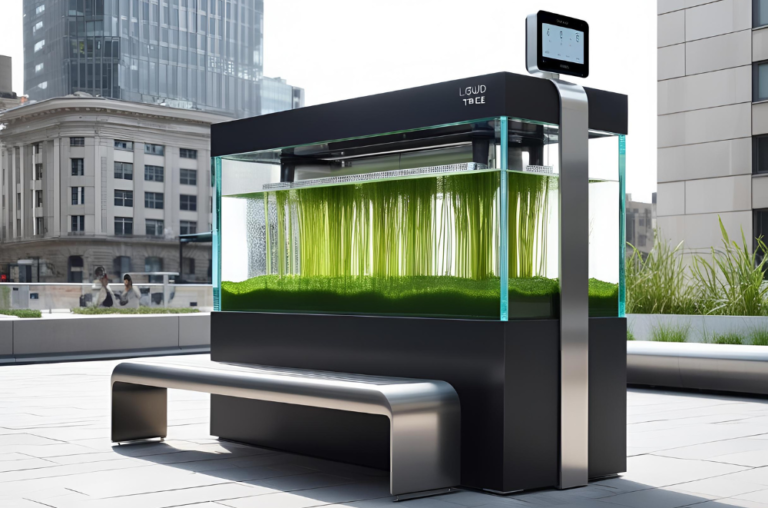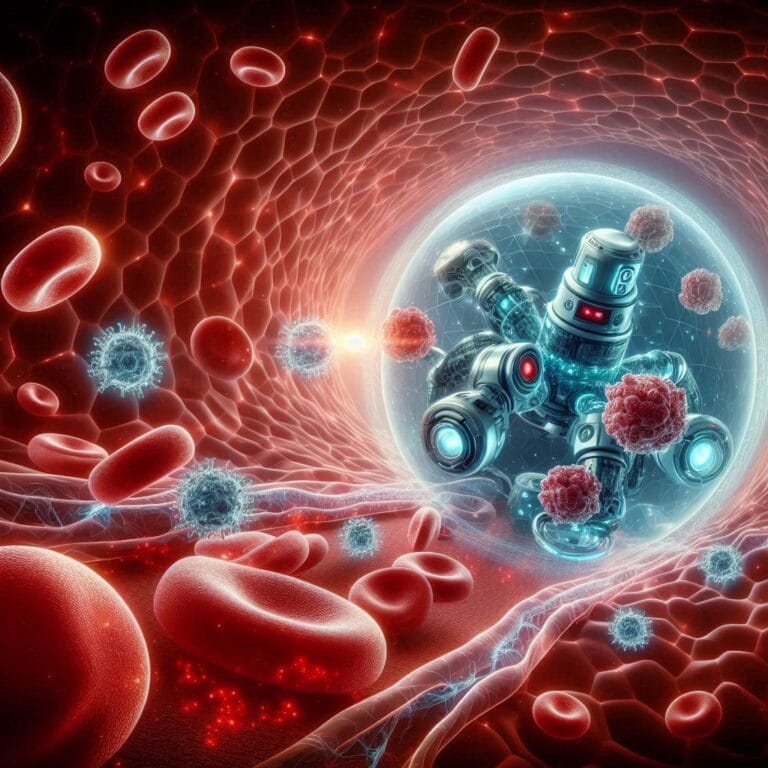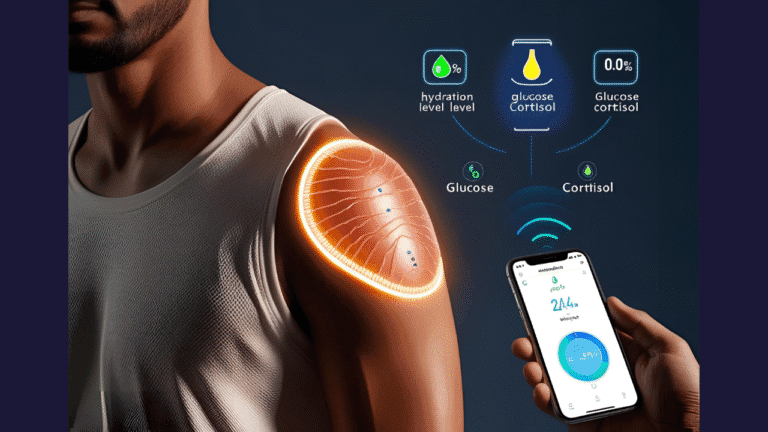🔍Introduction: Reflecting on the Future of Health
A Mirror That Sees More Than Just Your Reflection
Imagine stepping in front of a mirror, not only to check your appearance but to receive personalized health diagnostics, mood assessments, and even early warnings about potential health issues. This is no longer science fiction—it’s the reality unfolding with AI health mirrors. Powered by cutting-edge AI and computer vision, these smart mirrors do far more than reflect your image. They’re sophisticated, real-time health-monitoring devices capable of assessing everything from your skin’s condition to your emotional well-being.
By analyzing your skin tone, texture, and moisture levels, smart mirrors can provide early warnings for skin-related conditions such as acne, eczema, or even more serious concerns like skin cancer. Furthermore, AI health mirrors are being designed to analyze your mood based on facial expressions and detect subtle emotional cues that can be vital in mental health monitoring.
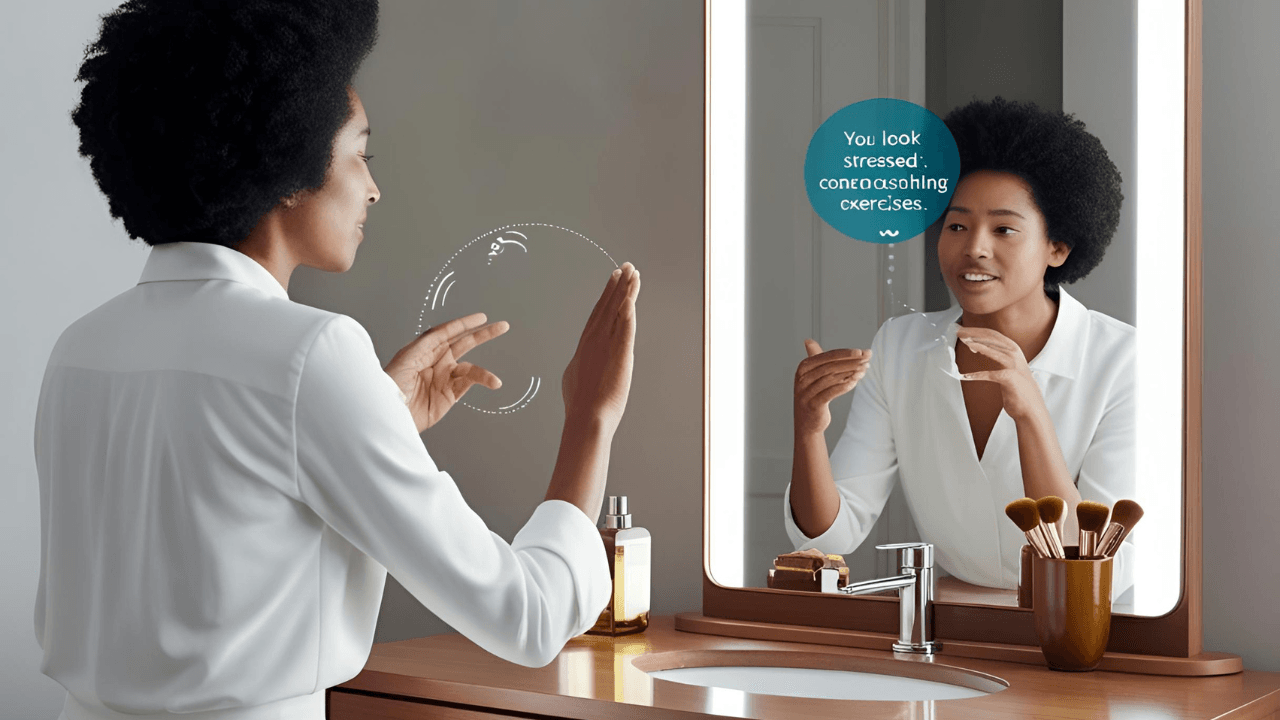
These mirrors aren’t just a passing trend; they’re rapidly becoming a foundational tool in wellness tech, seamlessly blending into daily routines, transforming traditional beauty and healthcare into something more proactive and personalized.
The Sci-Fi Element: From Fiction to Function
If you’ve ever imagined a world where technology can “read” your health just by looking at you, smart mirrors bring that vision one step closer to reality. Inspired by science fiction, where smart devices interact with humans in intuitive ways, these mirrors are turning that fantasy into functionality. They bring the futuristic idea of technology that not only observes but understands and responds to you—making the mirror a health advisor rather than just a reflective surface.
From detecting subtle changes in your skin’s health to providing insights into your emotional state, AI-powered mirrors offer a glimpse into a future where technology isn’t just an accessory; it’s an active participant in your personal well-being. What’s more fascinating is that these devices are rapidly evolving. The integration of AI health mirrors into our homes, healthcare settings, and even fitness routines is no longer a distant dream, but an exciting near-future reality.
Overview of Health Applications: Beyond Simple Reflection
The potential applications for smart mirrors in the healthcare space are vast and diverse. Early-stage research and development into AI health mirrors have demonstrated their capacity for revolutionizing personal healthcare management. Here are some exciting use cases:
- Skin Health Monitoring: The most prominent application of AI health mirrors lies in their ability to monitor and diagnose skin conditions. With integrated sensors and AI algorithms, these mirrors can assess the health of your skin, flagging irregularities like moles, spots, and lesions that may require attention. This could significantly improve early detection rates for skin cancer, potentially saving lives through earlier intervention.
- Mood Detection: Prioritizing Emotional Health as Much as Physical Health. Smart mirrors can analyze your facial expressions and even the subtle changes in your body language to assess your emotional state. By detecting shifts in mood, these mirrors could offer personalized suggestions for mental wellness, such as relaxation techniques, mental health resources, or reminders to check in with a healthcare provider.
- Vital Signs Monitoring: Looking beyond appearance and mood, some AI health mirrors are even capable of tracking vital signs like heart rate, respiratory rate, and blood pressure through advanced computer vision. This feature opens doors for at-home health monitoring, making it easier to track your health regularly without the need for expensive, complicated medical equipment.
🧬 The Technology Behind Smart Mirrors
Core Technology: The Power Behind Smart Mirrors
To truly understand how smart mirrors work, it’s essential to break down the technology powering them. These mirrors aren’t just high-tech gadgets; they’re sophisticated health-monitoring devices that use a combination of AI algorithms, advanced sensors, and cameras to assess various health metrics in real time.
AI Algorithms: The Brain Behind the Mirror
The magic of smart mirrors lies in their AI capabilities. AI algorithms process the data captured by the sensors and cameras to provide instant feedback on health metrics. These algorithms are trained to recognize patterns in skin health, facial expressions, and even physiological changes. By analyzing these patterns, smart mirror medical systems can offer personalized recommendations and alerts, such as potential skin conditions, changes in mood, or irregularities in vital signs.
The mirror’s AI system uses machine learning to continuously improve, getting better at detecting subtle changes over time and providing increasingly accurate diagnoses. For instance, an AI model might recognize early signs of skin cancer by detecting changes in a mole’s shape, size, or color.
Sensors and Cameras: Capturing the Details
The heart of AI skin diagnostics lies in the mirror’s use of sensors and cameras. These mirrors are equipped with infrared and optical sensors that capture detailed images of your skin, facial expressions, and body language. Infrared sensors can detect temperature variations, which can be linked to blood flow or inflammation, while optical sensors measure skin texture, moisture, and pigmentation.
High-resolution cameras are used to capture your face and skin up close, feeding this data to the AI system for further analysis. The cameras may use facial recognition technology to identify emotional cues, such as micro-expressions or subtle changes in your face that indicate stress, fatigue, or anxiety.
Display and User Interface: Easy-to-Understand Health Insights
Once the data is processed, it needs to be presented to the user in an easy-to-understand format. Smart mirrors typically feature a reflective display that overlays health metrics onto your reflection, ensuring the experience feels natural. The mirror displays this data in a way that doesn’t overwhelm the user. For example, it might show an alert about a possible skin condition or provide a simple readout of your mood based on the AI’s analysis.
Some smart mirror medical systems offer an interactive interface, where users can ask the mirror for more detailed reports or follow personalized health tips. This interface is designed to be intuitive, offering users clear, actionable insights that they can use to improve their health.
How the Mirror Works: Real-Time Diagnostics and Emotional Recognition
The core functionality of smart mirrors is their ability to provide real-time health diagnostics based on the user’s skin, mood, and even vital signs. Let’s dive deeper into how this technology operates in real-world scenarios:
AI-Powered Skin Diagnostics
One of the most advanced applications of AI skin diagnostics in smart mirrors is their ability to assess skin conditions. The mirror uses AI-powered tools like FotoFinder or similar diagnostic systems to analyze skin conditions. These tools can detect various skin anomalies, such as moles, wrinkles, or age spots, that could indicate potential health risks, including skin cancer.
The AI examines factors like skin texture, tone, and elasticity, comparing them with an extensive database of healthy and unhealthy skin patterns. It then offers insights into possible skin issues, helping users take action before conditions worsen. For example, the mirror could detect an unusual mole and recommend scheduling a dermatologist appointment for a closer look.
Emotional Recognition: Assessing Your Mental Health
Another fascinating application of smart mirrors is their ability to assess emotional well-being. By analyzing facial recognition data and biometric markers, the AI can evaluate your mood and stress levels. For instance, some smart mirrors use algorithms to detect early signs of stress, anxiety, or even depression, based on subtle changes in facial expressions like furrowing of brows, tightness around the eyes, or mouth tension.
Some systems also assess other emotional markers, such as blinking rate or posture, to offer a more comprehensive emotional health diagnosis. The AI uses this data to offer insights into your mental state and may even suggest mindfulness techniques, relaxation exercises, or other interventions to improve your well-being.
🩺 Applications in Healthcare: Beyond Vanity
Real-World Applications: How Smart Mirrors Are Revolutionizing Healthcare
Smart mirrors have moved beyond the realm of luxury tech to become genuine healthcare tools. By integrating AI and advanced sensors, these mirrors are making waves in medical diagnostics, providing users with instant health assessments and early warnings for potential health issues. Here’s how smart mirrors are contributing to healthcare:
Skin Cancer Detection: Early Diagnosis at Home
One of the most exciting applications of smart mirror medical technology is in skin cancer detection. Traditional skin checks require a visit to the dermatologist, but smart mirrors can now detect early skin conditions such as suspicious moles, skin discoloration, or lesions. The AI health mirror uses sophisticated AI skin diagnostics to examine a user’s skin and compare it to vast databases of known skin patterns. If any suspicious changes are detected, the mirror provides an alert, suggesting further medical investigation or a visit to a dermatologist.
This early detection could be life-saving, as skin cancer caught in its earliest stages is much more treatable than when discovered later.
Mental Health Monitoring: Detecting Emotional Shifts
AI health mirrors go beyond physical health by assessing emotional well-being. Using facial recognition algorithms, these smart mirrors can detect subtle changes in facial expressions, which can indicate underlying stress, anxiety, or depression. By analyzing emotions through eye movement, brow furrowing, and mouth tension, the mirror can provide insight into a user’s mental health.
For example, if the mirror notices increased signs of stress or anxiety over time, it can offer personalized suggestions, such as meditation techniques or breathing exercises. This could help users identify mood shifts early and seek help before mental health issues escalate.
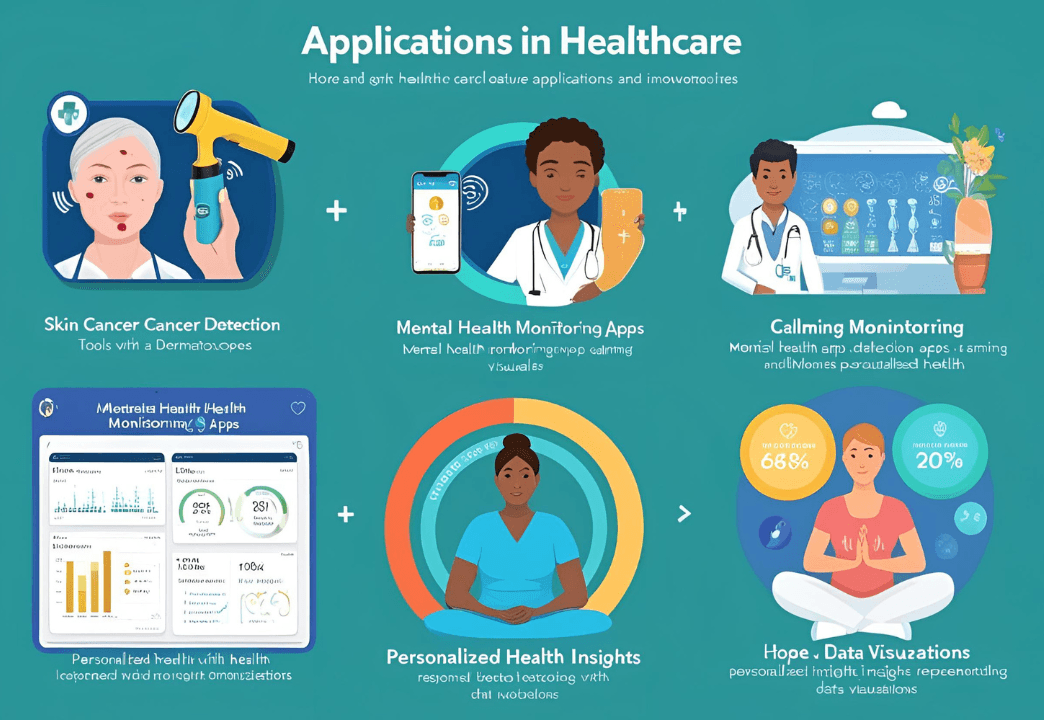
Personalized Health Insights: Real-Time Monitoring
Over time, a smart mirror medical device can provide a continuous stream of personalized health insights. As users interact with the mirror daily, it tracks important health data, such as skin conditions, emotional states, and even posture. For instance, if the mirror detects that a person is consistently slouching, it could prompt them to straighten up to avoid long-term spinal issues. Similarly, it could track hydration levels by observing changes in skin texture or monitor sleep quality by analyzing facial cues.
These personalized insights could also be helpful for chronic health management, allowing individuals to monitor conditions like heart rate, blood pressure, and more, all through an intuitive, everyday tool.
Future of Healthcare: Integration into Telemedicine
The potential for AI health mirrors extends into the realm of telemedicine, where these mirrors could function as home-based diagnostic tools. As healthcare becomes increasingly remote, smart mirrors could allow individuals to receive continuous health assessments at home. The data collected by the mirror could be securely transmitted to healthcare professionals, who could provide remote consultations, offer medical advice, or monitor chronic conditions over time.
For example, a doctor could use the data from a smart mirror to observe changes in a patient’s skin, mental health, or posture and provide actionable feedback without the need for an in-person appointment. This innovation has the potential to transform primary care, making it more accessible and efficient by incorporating mood monitoring into routine health tracking.
🏠 Smart Mirrors in Daily Life: More Than Just a Reflection
Fitness Tracking and Performance: Personalized Workouts in Your Home
The smart mirror fitness sector is rapidly growing, allowing individuals to have a full gym experience from the comfort of their homes. Smart mirrors like those from Mirror or Tonal have made waves by offering personalized workout sessions that cater to a user’s fitness goals and track their progress. These mirrors use AI to analyze a person’s movements, provide real-time feedback, and suggest modifications to improve posture and form.
By incorporating AI health mirror technology, these fitness mirrors can even track a user’s health metrics, like heart rate and calories burned, integrating this information into their workout routines. The mirror can also adjust the intensity of workouts based on real-time feedback, ensuring that users get the best results without risking injury.
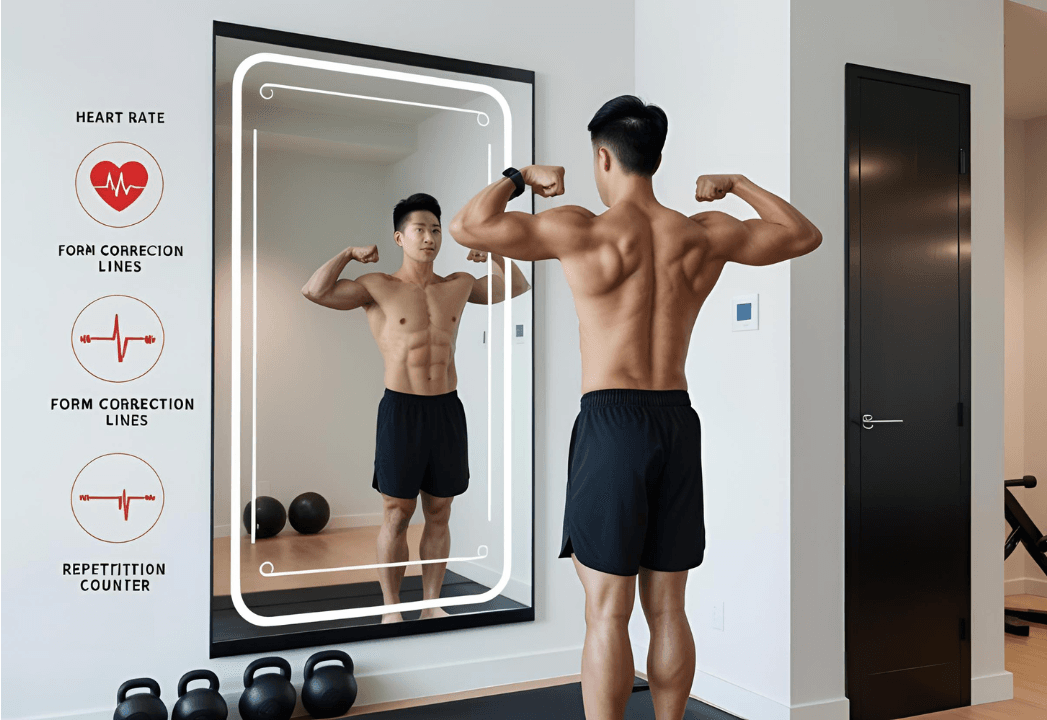
Wellness Integration in Home Spaces: A Holistic Health Tool
Beyond fitness, AI health mirrors are transforming wellness routines in everyday life. Imagine waking up and being greeted by a mirror that not only shows your reflection but also provides a quick overview of your health. This could include tracking hydration levels, offering reminders to drink water, or even suggesting mindfulness exercises to boost your mood.
Smart mirrors are also being integrated into home wellness routines, helping individuals track their sleep quality, monitor posture throughout the day, or even detect potential signs of dehydration through subtle changes in skin texture. These mirrors could offer health insights, such as personalized skincare routines or reminders for daily exercise, making them a seamless part of maintaining overall health.
Healthier Living Through Integration: The Personal Assistant You Need
In the near future, smart mirrors could evolve into fully integrated wellness assistants that track various aspects of your daily life. Imagine a mirror that reminds you to stretch after long hours of sitting, helps you work on your posture, or even tracks your mood fluctuations and offers advice on improving your mental well-being.
The AI health mirror could also help guide users to live a healthier lifestyle by suggesting activities, tracking their goals, and offering support in real-time. It could seamlessly blend with other smart home devices, like thermostats and air purifiers, to create an environment optimized for wellness.
⚡ The Future: Building AI-Powered Ecosystems
What’s Next for Smart Mirrors: A Connected Health Ecosystem
The future of smart mirror medical technology lies in creating an interconnected ecosystem of health devices, where AI-powered mirrors serve as hubs in a broader health management system. Picture a future where AI health mirrors work seamlessly with wearables like smartwatches, fitness trackers, and even home medical devices like blood pressure monitors and glucose meters. This ecosystem would provide a continuous, real-time picture of your health, enabling more accurate predictions and personalized care recommendations.
Rather than simply functioning as standalone gadgets, these smart mirrors could act as central nodes in a larger health network. For instance, a smart mirror medical device could track changes in your skin’s health while monitoring your heart rate and emotional state. Using AI, it would then connect this data with other health devices to offer personalized advice. It could suggest adjustments to your exercise routine or recommend lifestyle changes, creating a holistic approach to managing your health.
This convergence of health data could lead to predictive capabilities, where AI anticipates health issues before they become serious. For instance, if the mirror identifies alterations in your skin using AI-powered skin diagnostics, it could compare this information with heart rate data from your fitness tracker, providing early warnings about potential health issues such as high blood pressure or stress-induced skin conditions.
Building a Data-Driven Health Network: The Future of Smart Mirror Ecosystems
As AI health mirrors evolve, they will likely become a key part of a data-driven health network that incorporates multiple devices and sensors to create a more complete picture of personal well-being. These mirrors would not just rely on their own data but integrate seamlessly with other devices in your home or wearable health trackers.
Imagine a scenario where your smart mirror medical device is linked to a blood pressure monitor and a glucose meter. Each device could send its data to a central hub, such as a cloud system powered by AI, where the information is analyzed and used to create actionable health insights. The system could offer you a more accurate risk assessment of certain health conditions, or alert you when intervention is necessary. In this way, the future of health technology isn’t just about individual gadgets, but a connected ecosystem working together for more proactive health management.
As AI and machine learning algorithms evolve, they will be able to provide increasingly sophisticated recommendations, taking all your data into account and suggesting changes to your diet, exercise, or lifestyle based on real-time information.
AI Skin Diagnostics Integration: Personalizing Skincare and Health Alerts
One of the most compelling aspects of AI skin diagnostics in smart mirror medical devices is its potential to personalize skincare and medical care. In the future, smart mirrors could track your skin’s condition in real time and offer tailored recommendations for skincare products or even medical treatments.
These mirrors could analyze your skin for early signs of dermatological conditions, such as moles that may signal skin cancer or the effects of sun exposure. Based on environmental factors like UV radiation or air pollution, the mirror could provide insights on how these external conditions affect your skin health. The AI could also recommend skincare products or even alert you to consult with a dermatologist if it detects something concerning, like a significant change in your skin’s appearance.
With AI skin diagnostics continually analyzing your skin, smart mirrors could offer personalized, adaptive care suggestions—ensuring that you are not just reactive to health issues, but proactive in preventing them.
🌍 Ethical Considerations: The Privacy Paradox
Privacy and Data Security: Protecting Sensitive Health Information
The rise of AI health mirrors raises critical questions regarding data privacy and security. These mirrors collect highly sensitive personal data, including biometric details, emotional states, and health conditions like skin conditions, heart rate, and even mood. Such intimate information, when captured by AI algorithms and cameras, poses a significant risk if mishandled.
As smart mirror medical devices become integrated into daily health routines, it is essential that strict data protection measures are in place. This includes encrypted data storage, secure data transmission, and stringent privacy policies to ensure that users’ health information is kept confidential. Manufacturers must be transparent about how the data is used and offer users full control over their personal information, with the ability to opt-out of data collection or sharing.
Regulations such as GDPR (General Data Protection Regulation) in Europe or HIPAA (Health Insurance Portability and Accountability Act) in the United States will need to be followed to protect user privacy and ensure that sensitive health information is never misused.
Emotional Recognition and Consent: Ensuring Ethical Use of Biometric Data
AI health mirrors that employ emotional recognition tools bring another layer of ethical challenges. These mirrors can assess mood, anxiety, or stress by analyzing facial expressions and other emotional cues. While these tools can be beneficial for improving mental health, there is a risk that they could be used to exploit personal data for commercial or other non-consensual purposes.
The ethical challenge lies in ensuring that users fully understand and consent to the data being collected. How can they be assured that their biometric and emotional data is being used for their benefit and not for purposes like targeted advertising or surveillance? It’s crucial that users are given transparent and straightforward options to manage their data-sharing preferences, with the ability to withdraw consent whenever they choose.
Impact on Mental Health: Over-reliance on Technology
While AI health mirrors have the potential to monitor and improve emotional well-being, there is a concern that continuous emotional monitoring could lead to overdiagnosis or an over-reliance on technology for managing mental health. Could constant feedback on your mood or stress levels contribute to anxiety or make users overly dependent on the mirror’s insights?
There is a risk that individuals might become overly reliant on the mirror’s diagnostics, leading them to ignore professional mental health support. While smart mirrors are a valuable tool for emotional monitoring, they should not replace therapy or medical intervention when necessary. Instead, they should serve as a supplement to professional care, helping individuals become more aware of their emotional health and seek appropriate treatment when needed.
FAQ
How do smart diagnostic mirrors actually work on a technical level?
They combine high-resolution cameras, infrared sensors, and spectroscopic analysis to capture detailed biometric data. AI algorithms then process this information, detecting subtle changes in blood flow, oxygen saturation, hydration, and even early signs of disease—sometimes before visible symptoms appear.
What kinds of diseases or conditions can smart mirrors potentially detect?
Beyond skincare and fitness, researchers are exploring smart mirrors for detecting cardiovascular issues, respiratory conditions, sleep disorders, and even early neurological changes like Parkinson’s, by analyzing micro-expressions and posture.
How accurate are smart mirrors compared to traditional medical tests?
Currently, they are less accurate than lab diagnostics, but they excel at continuous, real-time monitoring. This makes them valuable for spotting trends, early warnings, and lifestyle insights, which can then be confirmed through medical tests.
What role could smart mirrors play in preventive healthcare?
They could act as first-line health monitors, alerting users to changes that warrant professional attention. For example, detecting irregular heart rates, stress patterns, or early dehydration could prevent bigger health issues over time.
How do smart mirrors address privacy and data security concerns?
Because they collect sensitive biometric and health data, advanced systems are being designed with end-to-end encryption, on-device AI processing, and user-controlled data sharing to protect privacy.
What industries are most interested in smart diagnostic mirrors?
Apart from healthcare, industries like fitness, wellness, luxury hospitality, cosmetics, and telemedicine are integrating smart mirrors for personalized experiences—ranging from workout feedback to tailored skincare routines.
Could smart mirrors replace routine check-ups in the future?
Not entirely. Instead, they could evolve into telemedicine hubs, syncing with doctors, pharmacies, and health apps. By 2050, your bathroom mirror might run daily scans, automatically share anomalies with your physician, and even order medications.
What challenges could prevent smart mirrors from becoming mainstream?
High costs, regulation hurdles, lack of standardization, and user skepticism about AI-driven diagnoses are the biggest roadblocks. However, as sensors become cheaper and AI becomes more reliable, these barriers will shrink.
🌐 Conclusion: From Sci-Fi to Reality—The Smart Mirror Revolution
Summary of Impact: A Revolution in Health and Wellness
The smart mirror medical is more than just an advanced piece of technology; it’s a revolution in personal health management. With the ability to monitor skin health, track emotional well-being, and integrate with other health devices, these mirrors offer a holistic approach to well-being. They bring us closer to a future where we no longer have to rely on traditional doctor’s visits for daily health assessments—smart mirrors will become central hubs for managing our health from the comfort of our homes.
AI skin diagnostics will become an essential tool in skin health, while the emotional recognition capabilities of smart mirrors will provide early warnings for mental health issues, offering users the ability to proactively manage their health.
Call to Action: Stay Ahead of the Curve
As AI health mirrors continue to evolve, it’s crucial to stay informed about the latest developments in this technology. Whether it’s monitoring your skin, tracking your mood, or providing fitness feedback, these mirrors will soon become indispensable tools for personal wellness. Keep an eye on the innovations in this field—smart mirrors could soon be in every home, changing the way we think about healthcare.
Final Thought: A New Era in Personal Healthcare
The real question is: Will smart mirror medical technology become a common fixture in every home in the future? With their potential to transform personal health management, the answer seems likely to be yes. As this technology continues to advance, we may one day look back and see these mirrors as a cornerstone in the evolution of personal healthcare—turning science fiction into everyday reality.
Curious about what’s next in medical innovation? If smart mirrors intrigued you, you’ll definitely want to explore these cutting-edge technologies that are reshaping the future of healthcare. Check out our in-depth articles on:
-
Augmented Reality in Healthcare – Discover how AR is enhancing surgeries, diagnostics, and patient experiences.
-
The Nanobots Cancer Cure – Learn how microscopic robots could revolutionize cancer treatment from within.
-
Microfluidic Devices: Transforming Biomedical Applications and Nanotechnology – See how lab-on-a-chip systems are miniaturizing medicine.
-
Miniature Robots: The Future of Medical and Industrial Robotics – Explore the rise of tiny machines performing big tasks.
-
Future of Medicine: 3D-Printed Hearts – Find out how bioprinting may solve organ shortages forever.
These emerging technologies are more than science fiction—they’re becoming tomorrow’s reality.



